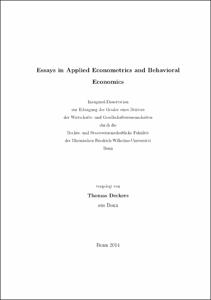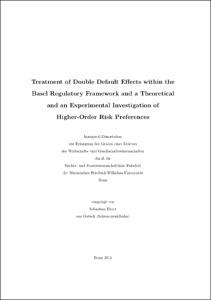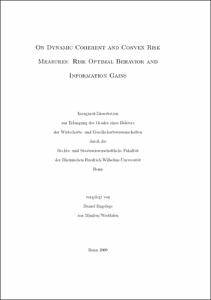Deckers, Thomas: Essays in Applied Econometrics and Behavioral Economics. - Bonn, 2014. - Dissertation, Rheinische Friedrich-Wilhelms-Universität Bonn.
Online-Ausgabe in bonndoc: https://nbn-resolving.org/urn:nbn:de:hbz:5-37339
Online-Ausgabe in bonndoc: https://nbn-resolving.org/urn:nbn:de:hbz:5-37339
@phdthesis{handle:20.500.11811/5959,
urn: https://nbn-resolving.org/urn:nbn:de:hbz:5-37339,
author = {{Thomas Deckers}},
title = {Essays in Applied Econometrics and Behavioral Economics},
school = {Rheinische Friedrich-Wilhelms-Universität Bonn},
year = 2014,
month = oct,
note = {This thesis is divided into four parts. This abstract provides separate previews for each of those four parts.
Cross-section regressions often examine many candidate regressors. We use multiple testing procedures (MTPs) controlling the false discovery rate (FDR) - the expected ratio of false to all rejections - so as not to erroneously select variables because many tests were performed, yielding a simple model selection procedure. Simulations comparing the MTPs with other common model selection criteria demonstrate that, for conventional tuning parameters of the selection procedures, only MTPs consistently control the FDR, but have slightly lower power. In an empirical application to growth, MTPs and PcGets/Autometrics identify similar growth determinants, which differ somewhat from those obtained by Bayesian Model Averaging.
While both economists and psychologists seek to identify determinants of heterogeneity in behavior, scholars from the two disciplines use different concepts to capture them. In this paper we first analyze the extent to which economic preferences and psychological concepts of personality - such as Big Five and Locus of Control - are related. We analyze data from incentivized laboratory experiments and representative samples and find only low degrees of association between economic preferences and personality. In a second step we regress life outcomes - such as labor market success, health status or life satisfaction - simultaneously on preference and personality measures. The analysis reveals that the two concepts are rather complementary when it comes to explaining heterogeneity in important life outcomes and behavior.
According to economic theory real income, i.e., nominal income adjusted for purchasing power, should be the relevant source of life satisfaction. Previous work, however, has only studied the impact of inflation adjusted nominal income. Therefore, we study how regional price levels affect satisfaction with live using a novel data set. The data set comprises about 7 million data points that are used to construct a price level for each of the about 400 administrative districts in Germany. In our model we explicitly model individual time-invariant characteristics and also include a rich set of control variables to cpature district heterogeneity other than the price level. Our results show that higher price levels significantly reduce life satisfaction. Furthermore, our findings point in the direction of a slight overreaction to prices compared to nominal income, i.e., the loss in life satisfaction caused by a higher price level is larger than the loss in life satisfaction induced by a corresponding decrease in nominal income. Our results provide an argument in favor of regional indexation of government transfer payments such as social welfare benefits.
We show that socioeconomic status (SES) is a powerful predictor of many facets of a child's personality. The facets of personality we investigate encompass time preferences, risk preferences, and altruism that are important noncognitive skills, as well as crystallized and fluid IQ that represent cognitive skills. We measure a family's SES by the mother's and father's average years of education and household income. Our results show that children from families with higher SES are more patient, less likely to be risk seeking, and score higher on IQ tests. About 20 to 40 percent of this relationship can be explained by dimensions of a child's environment that are shown to differ by SES: parenting style, quantity and quality of time parents spend with their children, the mother's IQ and economic preferences, a child's initial conditions at birth, and family structure. Personality profiles that vary systematically with SES offer an explanation for social immobility.},
url = {https://hdl.handle.net/20.500.11811/5959}
}
urn: https://nbn-resolving.org/urn:nbn:de:hbz:5-37339,
author = {{Thomas Deckers}},
title = {Essays in Applied Econometrics and Behavioral Economics},
school = {Rheinische Friedrich-Wilhelms-Universität Bonn},
year = 2014,
month = oct,
note = {This thesis is divided into four parts. This abstract provides separate previews for each of those four parts.
Cross-section regressions often examine many candidate regressors. We use multiple testing procedures (MTPs) controlling the false discovery rate (FDR) - the expected ratio of false to all rejections - so as not to erroneously select variables because many tests were performed, yielding a simple model selection procedure. Simulations comparing the MTPs with other common model selection criteria demonstrate that, for conventional tuning parameters of the selection procedures, only MTPs consistently control the FDR, but have slightly lower power. In an empirical application to growth, MTPs and PcGets/Autometrics identify similar growth determinants, which differ somewhat from those obtained by Bayesian Model Averaging.
While both economists and psychologists seek to identify determinants of heterogeneity in behavior, scholars from the two disciplines use different concepts to capture them. In this paper we first analyze the extent to which economic preferences and psychological concepts of personality - such as Big Five and Locus of Control - are related. We analyze data from incentivized laboratory experiments and representative samples and find only low degrees of association between economic preferences and personality. In a second step we regress life outcomes - such as labor market success, health status or life satisfaction - simultaneously on preference and personality measures. The analysis reveals that the two concepts are rather complementary when it comes to explaining heterogeneity in important life outcomes and behavior.
According to economic theory real income, i.e., nominal income adjusted for purchasing power, should be the relevant source of life satisfaction. Previous work, however, has only studied the impact of inflation adjusted nominal income. Therefore, we study how regional price levels affect satisfaction with live using a novel data set. The data set comprises about 7 million data points that are used to construct a price level for each of the about 400 administrative districts in Germany. In our model we explicitly model individual time-invariant characteristics and also include a rich set of control variables to cpature district heterogeneity other than the price level. Our results show that higher price levels significantly reduce life satisfaction. Furthermore, our findings point in the direction of a slight overreaction to prices compared to nominal income, i.e., the loss in life satisfaction caused by a higher price level is larger than the loss in life satisfaction induced by a corresponding decrease in nominal income. Our results provide an argument in favor of regional indexation of government transfer payments such as social welfare benefits.
We show that socioeconomic status (SES) is a powerful predictor of many facets of a child's personality. The facets of personality we investigate encompass time preferences, risk preferences, and altruism that are important noncognitive skills, as well as crystallized and fluid IQ that represent cognitive skills. We measure a family's SES by the mother's and father's average years of education and household income. Our results show that children from families with higher SES are more patient, less likely to be risk seeking, and score higher on IQ tests. About 20 to 40 percent of this relationship can be explained by dimensions of a child's environment that are shown to differ by SES: parenting style, quantity and quality of time parents spend with their children, the mother's IQ and economic preferences, a child's initial conditions at birth, and family structure. Personality profiles that vary systematically with SES offer an explanation for social immobility.},
url = {https://hdl.handle.net/20.500.11811/5959}
}









